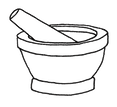 For most people with prostates, dysfunction in this small organ will lead to uncomfortable symptoms late in life. This becomes more common after around age 50, but may occur much earlier, and is almost universal after age 80 or so. For those that may not know (many people it turns out!), the prostate is a small, walnut shaped organ between the penis and the rectum. The urethra passes through the prostate. A major function of the prostate is to secrete fluid which nourishes protects the sperm during ejaculation. Prostate conditions The most common medical conditions associated with the prostate are: Benign Prostatic Hyperplasia - BPH
Protatitis
Prostate cancer
General support for the prostate Prostate conditions may develop in conjunction with higher circulating amounts of insulin or chronic inflammation. If either of these two are present, then addressing those may ultimately help with prostate health as well. Physical support Too much sitting can be harmful to prostate health, both due to the inactivity as well as pressure on the perineum. Here are some ideas for how to address this: Sitting
Movement:
Dietary support Diet is very individual, and dietary recommendations will vary from person to person, however here are some general guidelines: Increase:
Avoid/reduce:
Herbal support For support of the prostate and surrounding organs there are a few possibilities: Urinary support
Conclusion The prostate is a little understood but important gland. People with prostates are at risk for developing urinary symptoms or other problems in the later stages of life, but there is a lot that we can do with simple lifestyle changes to preserve the health of this organ. Please share with anyone you think would benefit! Thanks for reading! By Nick Cavanaugh References
1 Comment
|
Details
RAILYARDCheck in here to keep updated on news and activities at the apothecary. Archives
April 2024
Categories
All
|
railyard apothecary
*These statements have not been evaluated by the Food and Drug Administration. This product is not intended to diagnose, treat, cure, or prevent any disease. For educational purposes only.
|
|

 RSS Feed
RSS Feed
